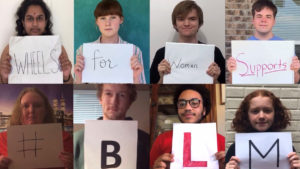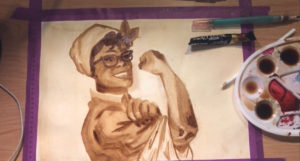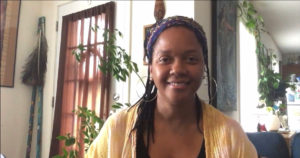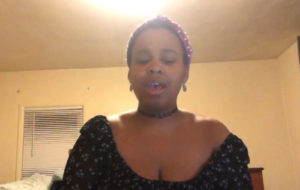Breonna Taylor. George Floyd. Sandra Bland. And so many others.
These names have been echoed by protesters and politicians around the United States to commemorate Black individuals who have been killed by police brutality. On June 19, Erin Lockett ’20 recited them on Zoom to a group of approximately 200 listeners when introducing the Juneteenth Cabaret, a virtual benefit presented by Black Fems United (BFU) of Ithaca College.
“The senseless killing of Black men, women and children must end,” Lockett said in her introduction to the event. “Say his name. Say her name. Continue saying their names.”
Although it is not a federal holiday, Juneteenth is celebrated on June 19 to commemorate the emancipation of slaves in the U.S. Attendees were asked to donate at least $5 through Givebutter to one of three highlighted organizations. After this, they were emailed a Zoom link to the cabaret.
The cabaret benefited The Doonie Fund, an organization that supports Black women; The Colin Kaepernick Know Your Rights Camp Legal Defense Initiative, a legal defense fund that seeks to uplift Black and Brown communities; and the Women for Political Change political action fund, a nonprofit that invests in young women and transgender and nonbinary people. Donations were either given to one of the organizations or split among the three depending on each individual’s request on Givebutter.

By the time the event began, attendees had raised $7,316. Wheels for Women — a nonprofit that works with the Sakhi Shelter in Kerala, India, to support victims of domestic and sexual abuse — partnered with BFU to assist with donations. Because Wheels for Women is a recognized club at Ithaca College but BFU is not, Wheels for Women was able to collect the donations and distribute them to every charity, said rising junior Jessica Brock, vice president for BFU.
Brock said it was astounding to see how much money people were donating, especially because she had no official goal in mind. It was rewarding to wake up every day of the week preceding the cabaret to a new total, often increased by a thousand or so more dollars, on the donation page, Brock said. The cabaret was also sponsored by Performing Arts for Social Change, a program that works with marginalized individuals who are underrepresented in theater to create pieces inspired by their own experiences.

The cabaret was structured as a prerecorded and edited video, approximately one hour and 30 minutes long, that highlighted Black performers, writers and activists from Ithaca College, Cornell University and different parts of the country. While some participants sang excerpts from musicals, others performed monologues, poems or their original work.
Brock, the cabaret’s video editor, played the show through a screen share. She said that as she was editing, she decided to intersperse the performances with photos and videos of police brutality and the recent protests, a process that she said was draining at times. Brock also said it was important to her to bookend the performances, other video clips and apology statements from theater companies in Ithaca with news reports or videos of violence against Black people to show that an apology can only go so far — that actions are far more important than words.
“It was really mentally taxing to try to edit [George Floyd’s] murder,” Brock said. “You see this clip of this Black man being murdered, then you hear this song, and then you hear this apology, and, even after the apology, guess what? It goes right back to the murders.”
The Cherry Artspace, Civic Ensemble, House of Ithaqua, Ithaca Shakespeare Company and the Kitchen Theatre Company (KTC) all shared apologies for any unconscious microaggressions that may have occurred on their stages. They also stood in solidarity with the Black Lives Matter movement and committed to uplifting Black and Indigenous People of Color, or BIPOC, through paid professional work.
Then, after KTC’s video, the show shifted into a news report on Dominique “Rem’mie” Fells, a Black transgender woman who was killed in June in Philadelphia.
“We appreciate the apologies, and we appreciate the efforts and everything that you’re doing, but you have to know that … we continue to fight and we continue to make the actions,” Brock said.
A section of the cabaret was also dedicated to shining light on “Karens,” a colloquial term for white people, usually women, who use their privilege to have a Black person harmed or demonized.

A segment of the cabaret highlighted a video taken of Amy Cooper, a white woman who called police on Christian Cooper — a Black birdwatcher in Central Park who has no relation to Amy Cooper — after he asked her to leash her dog per the park’s rules in May. The cabaret also included a segment on Emmett Till, a Black man who was murdered in 1955 by two white men after their sister alleged Till was flirting with her.
Activist and playwright Regina Y. Evans spoke about the effects of human trafficking on young Black girls in her section of the cabaret. She said she felt it was important to bring this topic to the event because it is rarely spoken about nationally.
“If Black lives [matter], then these girls’ lives matter, too,” Evans said. “For it to not be in the national discourse during this time of COVID, of protests, it’s not clicking.”
Evans also said that seeing the creativity of young people on display at the show made her emotional but optimistic.
“I had to sign out because I was weeping so hard,” she said. “The grace and the power and the wisdom of these young people was super hopeful.”
For her, Lockett said Juneteenth is a celebration of Black lives. She also said that the cabaret seeks to initiate active change within the Ithaca community for the Black Lives Matter movement.

“Personally, Juneteeth means honoring those we’ve lost and working to support and create a beautiful future,” she said via email. “It’s about acknowledging the ways we [as the black community] have struggled and choosing to continue to chase freedom and fight for change.”
But as changes to recognize Juneteenth as an official paid holiday on a local and national level are set in motion, Evans said she would not mind if Black people kept the holiday to themselves.
“I’m not opposed to things staying underground,” she said. “There’s some things that are quiet because you want to keep them for yourself. … Things don’t have to be validated by other people for me to know the power of them and to believe in the power of them.”
Brock said that when the video was finished, it was beautiful to see so many Black artists represented in a medium in which they could express themselves. She also said she hopes the cabaret, and the Black Lives Matter movement, will push allies toward tangible and consistent change.
“I want all of us to get together and speak to the people who need to hear it,” she said. “Let’s talk to the people. Let’s talk to our state representatives. Let’s talk to our politicians, the people that are supposed to be representing us. … I think that’s what I want to get the ball rolling on, especially in Ithaca. Recognize your privilege, use your platform and push. Do not wait for a Black person to tell you to move. If you care, you’re going to move. And guess what? We’re going to move with you.”














